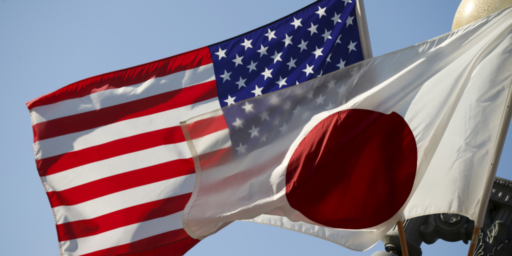Democratic Peace a Myth?
Novelist and former Bob Dole speechwriter Mark Helprin has what Taegan Goddard terms “a devastating piece” in yesterday’s LAT on “The myth that shapes Bush’s world.”
THE PRESIDENT believes and often states, as if it were a self-evident truth, that “democracies are peaceful countries.” This claim, which has been advanced in the past in regard to Christianity, socialism, Islam and ethical culture, is the postulate on which the foreign policy of the United States now rests. Balance of power, deterrence and punitive action have been abandoned in favor of a scheme to recast the political cultures of broad regions, something that would be difficult enough even with a flawless rationale because the power of even the most powerful country in the world is not adequate to transform the world at will.
Nor is the rationale flawless. It is possible to discover various statistical correlations among democracy and war and peace, depending on how they are defined and in what time frames. The chief pitfall in such social-science exercises is in weighing something such as, for example, the Mughal Campaign in Transoxiana, 1646-47, against something like, for example, World War II. Generally, a straightforward historical approach is better. And what does it show?
Even without reference to the case of a democracy that, finding self-defense insufficient justification and retaliation an insufficient end, makes war on a non-democracy so as to make the non-democracy a democracy, the postulate on which the president has in all good faith chosen to rely is contradicted by inconvenient fact.
Germany, the primary instigator of World War I, was a democracy. Although party governance weakened immediately before the war, it did so according to the popular will. When hostilities broke out, power flowed back to the Reichstag as a result of its increased belligerency in reaction to the threat of, perhaps ironically, nondemocratic Russia. Democratic Italy joined the entente because it had been spoiling for a fight to wrest South Tyrol from Austria. Extending its northern defenses to the natural Alpine barrier was obviously in Italy’s interest, and popular sovereignty acted not as a break on war for this purpose but as a stimulus.
Less a democracy but a democracy nevertheless, Japan saw its parliamentary government wax and wane in the decades before World War II, losing eventually to the militarists but resurging as late as 1937 almost to regain control, with the Meiji Constitution unrepudiated and in force throughout the war.
The problems with this assessment are manifold. Most obviously, it is rather absurd to count Imperial Germany (ruled by Kaiser Wilhelm II) or Imperial Japan (ruled by a military junta under the oversight of an emperor) as “democracies.”
Now, it is certainly true that democracies historically go to war just as often as non-democracies. The modern Democratic Peace argument, though, is that democracies do not war with other democracies. This postulate has stood up so well to rigorous testing that it has been dubbed “as close as anything we have to an empirical law in international relations.”1
______________
1Jack Levy, “Domestic Politics and War,” 18 J. Interdisciplinary History (1988) 653, 662.






James, my initial concern was in the last lines where you mentioned that Levy says that “democracies don’t go to war with democracies….” and that “this postulate has stood up to rigorous testing”. I wondered to myself whether the post WWII world was sufficient time for this so-called rigorous testing to bear itself out. So, I searched Levy’s article and he goes back into history much farther than I did in my own mind. Just a comment that my frame of reference differed from his prior to reading his article.
It’s a serious and interesting article. Some points.
I don’t think any one thinks that democracy is a panacea, but, politics being what it is, the message tends to get simplified when presented to the public.
It think the idea is that democracy will grow and spread (perhaps with frustrating slowness) to the point where Islamists will lose one of their most potent – and undeniable – debating points – the fact that the Arab government they happen to be attacking is dictatorship supported by the “West.”
As Zarqawi has admitted, democracy “robs” them (Islamists) of their “pretense.” No could they even pretend to be fighting for the people against a dictatorship. Apparently, Che said that it is almost impossible to successfully revolt against a democratic government.
Also, Helprin’s suggestion that we should not refrain from working with dictatorships is not exactly an idea that is new or without its own perils.
We have worked cooperatively with Hussein – whose move on Kuwait started the latest round of Middle East upheaval, and we currently have a superficially cordial relationship with the Saudi royal family who rule the country that supplied most of the 9/11 terrorists.
Rudy Rummel, the scholar of the field, has his own blog called, appropriately enough, Democratic Peace (and a prominent place on my blogroll). He’s got lots of hard data there for those who are interested in such things.